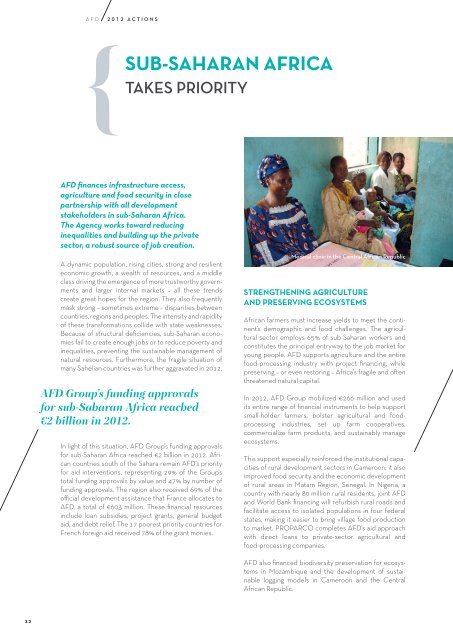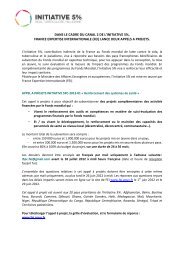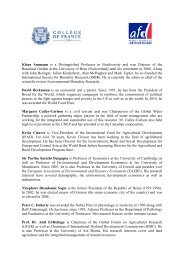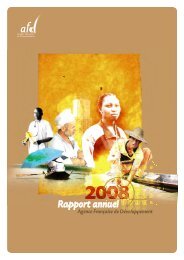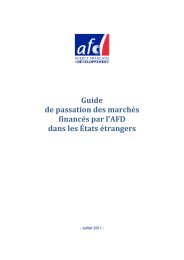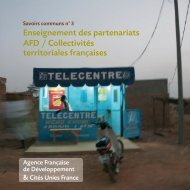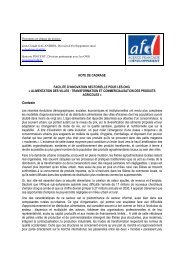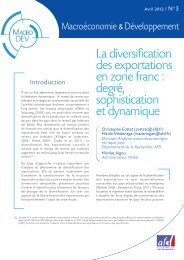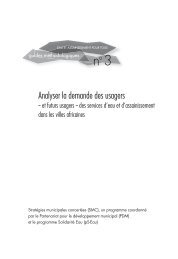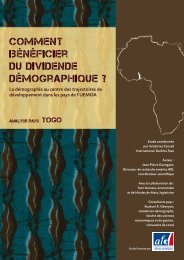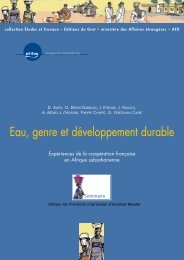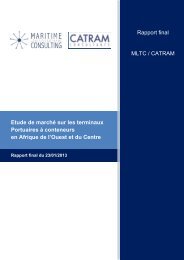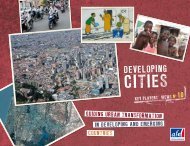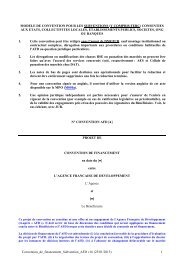Annual Report - Agence Française de Développement
Annual Report - Agence Française de Développement
Annual Report - Agence Française de Développement
Create successful ePaper yourself
Turn your PDF publications into a flip-book with our unique Google optimized e-Paper software.
AFD2012 ACTIONSSUB-SAHARAN AFRICATAKES PRIORITYAFD finances infrastructure access,agriculture and food security in closepartnership with all <strong>de</strong>velopmentstakehol<strong>de</strong>rs in sub-Saharan Africa.The Agency works toward reducinginequalities and building up the privatesector, a robust source of job creation.A dynamic population, rising cities, strong and resilienteconomic growth, a wealth of resources, and a middleclass driving the emergence of more trustworthy governmentsand larger internal markets – all these trendscreate great hopes for the region. They also frequentlymask strong – sometimes extreme – disparities betweencountries, regions and peoples. The intensity and rapidityof these transformations colli<strong>de</strong> with state weaknesses.Because of structural <strong>de</strong>ficiencies, sub-Saharan economiesfail to create enough jobs or to reduce poverty andinequalities, preventing the sustainable management ofnatural resources. Furthermore, the fragile situation ofmany Sahelian countries was further aggravated in 2012.AFD Group’s funding approvalsfor sub-Saharan Africa reached€2 billion in 2012.In light of this situation, AFD Group’s funding approvalsfor sub-Saharan Africa reached €2 billion in 2012. Africancountries south of the Sahara remain AFD’s priorityfor aid interventions, representing 29% of the Group’stotal funding approvals by value and 47% by number offunding approvals. The region also received 69% of theofficial <strong>de</strong>velopment assistance that France allocates toAFD, a total of €603 million. These financial resourcesinclu<strong>de</strong> loan subsidies, project grants, general budgetaid, and <strong>de</strong>bt relief. The 17 poorest priority countries forFrench foreign aid received 78% of the grant monies.Medical clinic in the Central African RepublicSTRENGTHENING AGRICULTUREAND PRESERVING ECOSYSTEMSAfrican farmers must increase yields to meet the continent’s<strong>de</strong>mographic and food challenges. The agriculturalsector employs 65% of sub-Saharan workers andconstitutes the principal entryway to the job market foryoung people. AFD supports agriculture and the entirefood-processing industry with project financing, whilepreserving – or even restoring – Africa’s fragile and oftenthreatened natural capital.In 2012, AFD Group mobilized €266 million and usedits entire range of financial instruments to help supportsmall-hol<strong>de</strong>r farmers, bolster agricultural and foodprocessingindustries, set up farm cooperatives,commercialize farm products, and sustainably manageecosystems.This support especially reinforced the institutional capacitiesof rural <strong>de</strong>velopment sectors in Cameroon; it alsoimproved food security and the economic <strong>de</strong>velopmentof rural areas in Matam Region, Senegal. In Nigeria, acountry with nearly 80 million rural resi<strong>de</strong>nts, joint AFDand World Bank financing will refurbish rural roads andfacilitate access to isolated populations in four fe<strong>de</strong>ralstates, making it easier to bring village food productionto market. PROPARCO completes AFD’s aid approachwith direct loans to private-sector agricultural andfood-processing companies.AFD also financed biodiversity preservation for ecosystemsin Mozambique and the <strong>de</strong>velopment of sustainablelogging mo<strong>de</strong>ls in Cameroon and the CentralAfrican Republic.22


